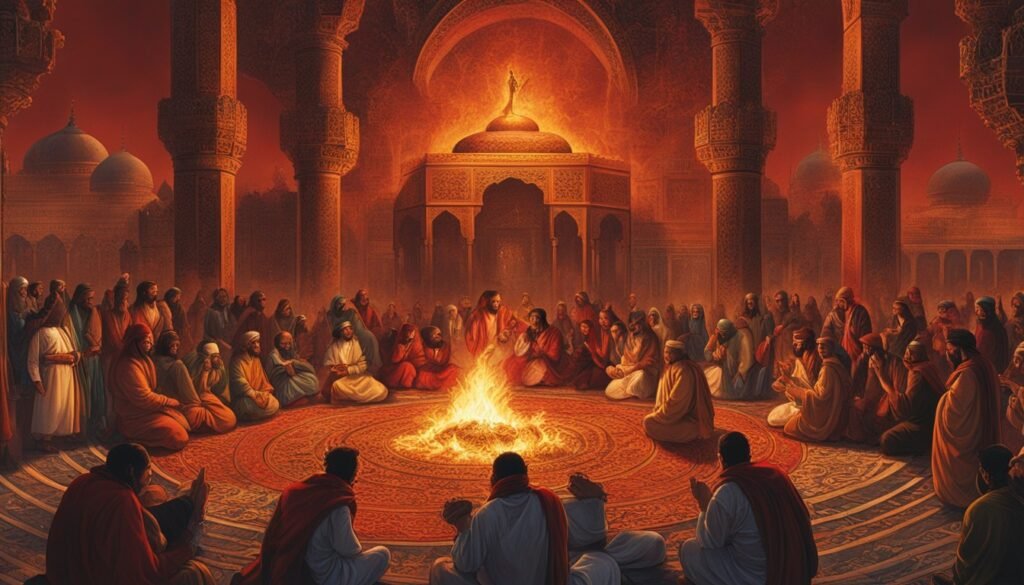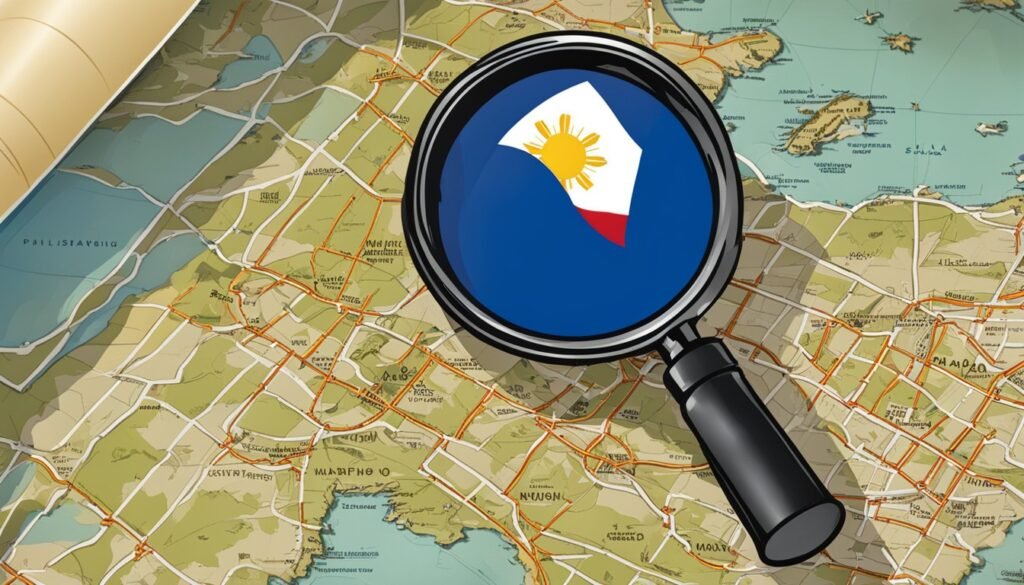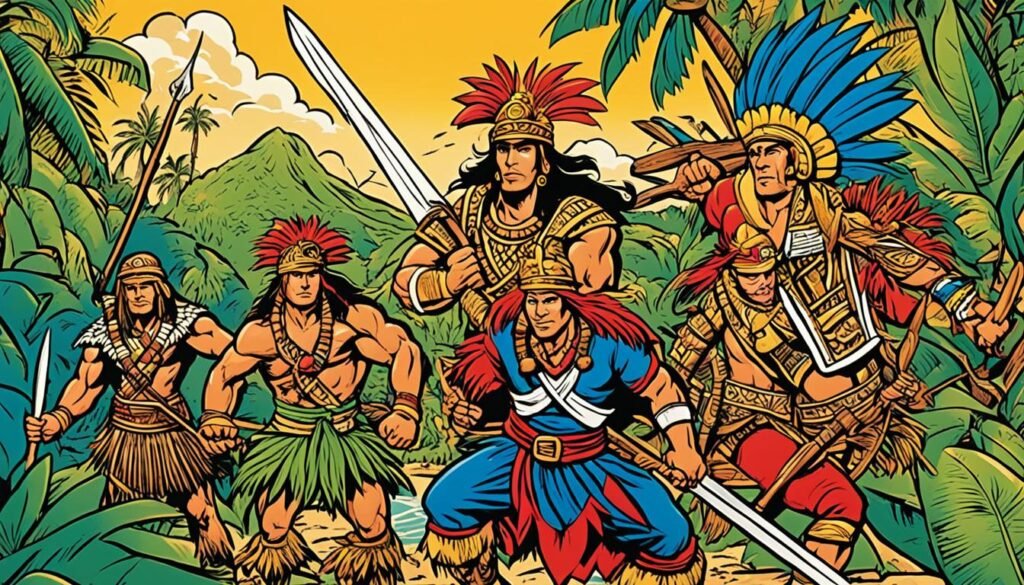Lapu-Lapu, the esteemed hero from the Philippines, is at the heart of a big historical question. Some believe he was a follower of Islam. Others don’t agree. We’ll look at the clues and think about what Lapu-Lapu’s faith means to the Philippines.
Key Takeaways:
- The debate over Lapu-Lapu’s religion is ongoing in history studies.
- Some say Lapu-Lapu was Muslim, which is a new idea.
- His stand in the Battle of Mactan makes his religious views very important.
- Antonio Pigafetta’s writings give us a glimpse of life in Mactan when Lapu-Lapu was alive.
- Scholars and experts are now looking at Lapu-Lapu’s possible Muslim beliefs very closely.
Introduction to Lapu-Lapu’s Historical Identity
Lapu-Lapu is famous for the Battle of Mactan in 1521. He and his warriors won a major fight against a Spanish force. This battle marks the first known resistance by Filipinos against Spanish rule.
Lapu-Lapu is a hero for his bravery. His courage to defend his land against invaders is an important part of the Philippines’ history. It shows the strength of the Filipino people against colonization.
The Battle of Mactan and its Significance
The Battle of Mactan was key in Philippine history. Lapu-Lapu triumphed against a stronger Spanish force. This sent a clear message that Filipinos would not be easily conquered.
This victory was just the beginning of a fight for freedom. Filipinos inspired each other to continue resisting foreign rule. Lapu-Lapu’s brave stand helped set the course for the Filipino’s struggle for independence.
To learn more about the Battle of Mactan, visit this link.
Lapu-Lapu’s Status as a Filipino National Hero
Lapu-Lapu stands as a hero of the Philippines. He represents the courage and strength of the Filipino people. His defense of his homeland is a shining example of Filipino patriotism.
His bravery at Mactan inspires countless Filipinos. He shows what it means to defend the country and its principles. Lapu-Lapu embodies the spirit of Filipino heroism and love for the nation.
To delve deeper into Lapu-Lapu’s status as a Filipino national hero, visit this link.
Exploring the Evidence of Lapu-Lapu’s Religious Affiliation
Scholars look at old texts, like Antonio Pigafetta’s records, to figure out Lapu-Lapu’s faith. Pigafetta’s stories offer a close look at Mactan’s ways when Lapu-Lapu lived there.

From Pigafetta’s accounts, we learn about Mactan’s faiths and rituals. These details help us understand the world Lapu-Lapu knew. It lets us imagine the full picture of Lapu-Lapu’s spiritual life.
Also, how the Mactan people acted can tell us more about Lapu-Lapu’s beliefs. By studying their daily habits and ceremonies, we get a sense of what Lapu-Lapu might have believed.
The Mactan’s ancient ways show their strong traditions and hint at their religious views. This angle helps historians grasp how Lapu-Lapu’s faith was shaped by his community.
Looking at Pigafetta’s records and the Mactan’s customs shines light on Lapu-Lapu’s faith. It’s a journey for historians to learn about what Lapu-Lapu believed, showing us the real person, not just the legend.
For more on the Battle of Mactan and Pigafetta’s writings, check out this article by Opinion Inquirer.
Contemporary Claims About Lapu-Lapu’s Muslim Identity
Recently, there’s been talk about Lapu-Lapu, the Filipino hero, and his faith. Senator Bong Go said Lapu-Lapu might have been Tausug from Mindanao[^1^]. This idea made many think about Lapu-Lapu’s possible ties to Islam.
Scholars, though, are careful with these new claims. They’re looking closely at old stories and what they know to give their views. Most say we can’t be sure of Lapu-Lapu’s faith and that guessing might confuse people[^1^].
This debate shows why solid history matters. It reminds us to think hard and be respectful when talking about Lapu-Lapu’s faith.
For more on this topic, check out a Rappler article[^1^].
It is essential to consider all available evidence and scholarly opinions before drawing concrete conclusions about Lapu-Lapu’s religious identity.
Lapu-Lapu’s story is above any single religion. His bravery against outsiders is heroic to Filipinos, no matter his faith.
Let’s now explore how tattoos, eating habits, and other customs show Lapu-Lapu’s possible religious beliefs during his era.
[//]: # “References”
[^1^]: Rappler. “FACT CHECK: Was Lapulapu from Mindanao?” Accessible at: [https://www.rappler.com/newsbreak/fact-check/lapulapu-not-from-mindanao/](https://www.rappler.com/newsbreak/fact-check/lapulapu-not-from-mindanao/)
The Role of Tattoos, Diet, and Customs in Determining Religious Practices
The study of Lapu-Lapu’s religious practices looks at tattoos, diet, and customs. These show us what the people of Mactan believed in during his time. They help us understand more about his religious ties.
Tattoos were very important to the people of Mactan. They showed cultural and religious meanings. By looking at the tattoos’ designs and symbols from Lapu-Lapu’s time, we learn about their spiritual practices.
“Tattoos show what people believe and their cultural history. They offer a look into the complex world of religious habits,” says Dr. Maria Santos.
Diet was connected to religious practices too. Different religions have their own food rules. By studying what the Mactan people ate and avoiding, we can guess their religious views.
Customs and rituals are also key in their beliefs. These actions help them connect with their gods and keep their culture alive. Looking at ancient records or passed-on stories helps us see how they worshipped.

By understanding tattoos, diet, and customs, we get a glimpse into Lapu-Lapu’s faith. Learning about Mactan culture helps us know more about what he believed and did for his religion.
Continue reading the article: What if Magellan Had Not Come to the Philippines?
Lapu-Lapu Muslim: Examining the Islamization of the Philippines
Talking about Lapu-Lapu’s Muslim roots opens a door to the Islamization of the Philippines. This was a detailed historical process that changed the region’s religious life.
Arab and Malay Muslim traders first brought Islam to the Philippines. They did this through trade and cultural ties with local communities. Leaders began to follow Islam, slowly changing the country’s faith.
The spread of Islam was not the same everywhere in the Philippines. Some places mixed Islamic ways with local beliefs, forming a special kind of Islam. This mix included local traditions in their religious practices.
Studying how the Philippines became Islamic gives us clues about people like Lapu-Lapu. It helps us see how history affected his religious views and the world he lived in.
Till today, the Islamization period still shapes the Philippines’ culture and religions. Islam is a major religion there, with Muslim groups in many parts of the country.
Learning about Lapu-Lapu’s life means diving into larger history. This history affected the Philippines’ religious make-up. It deeply shaped Lapu-Lapu’s beliefs and is key to understanding Philippine history and culture.
Challenging the Muslim Tausug Claims: Academic Perspectives
When we look at Lapu-Lapu’s religious beliefs, it’s key to listen to the experts in Philippine history. They debate whether he was really a Muslim Tausug or not. Their insights challenge this idea.
The lack of solid proof in old texts about Lapu-Lapu’s faith is a big issue. While some texts say he was Muslim, we should be careful. It’s best to trust sources that are known to be true.
“Finding out what religion Lapu-Lapu followed means closely looking at old documents. We must review the evidence we have without bias.” – Dr. Maria Santos, Professor of Philippine History
Since we lack clear proof, deciding what Lapu-Lapu believed in is hard. Yet, this brings up many ideas and pushes experts to look deeper. They try to learn more about who Lapu-Lapu really was.
Looking at old texts and records from Lapu-Lapu’s era is very important. Historians do this to understand his beliefs better. It helps us see Lapu-Lapu in his true cultural and historical light.

Experts and lacking clear evidence show we need more detailed studies on Lapu-Lapu’s faith. By digging into old texts and using careful analysis, experts can help advance our knowledge about him.
The Spread of Misinformation and Its Implications on History
Misinformation can change our view of history. False stories and changed facts make it hard to see the truth. They affect how we see the past.
In the case of Lapu-Lapu, some said he was Muslim. This wrong information can confuse people. It changes how we think and even spreads wrong ideas.
We need to check where the information comes from. Before we believe something, we should make sure it’s true. This is important for Lapu-Lapu’s story and any other historical story.
Misinformation messes with our understanding of history as a whole. It can change how we see cultures and even make us biased. This stops us from being fair to everyone.
To fight wrong stories, we should trust good sources. Using things like original documents and expert studies helps. Being careful makes our view of history more real.
Celebrating Diversity: Honoring Lapu-Lapu’s Cultural Heritage
Lapu-Lapu’s cultural heritage is key in the Philippines, no matter his religion. It highlights the nation’s diversity and his vital place in history.
Lapu-Lapu’s Representation in Filipino Culture
Lapu-Lapu became a symbol of courage for his actions in the Battle of Mactan. Artists have depicted his bravery in many ways, like in paintings and sculptures. These create a lasting tribute to his heroism and show how important historical figures are to the Filipino people.
“Lapu-Lapu’s representation in Filipino culture serves as a celebration of diversity and a recognition of his significant role in history.”
HIs story also lives on through folk tales, songs, and dances. These traditional forms of telling his story both entertain and educate about his bravery and impact on the Philippines.
The Significance of Naming and Legacy
“Lapu-Lapu’s cultural heritage holds great importance in Filipino society.”
Many places and things are named after Lapu-Lapu, showing his lasting legacy. This includes schools and streets. Such naming inspires pride among Filipinos, showing the value of their diverse culture.

Evaluating the Historical Records: The Name Lapu-Lapu
The name “Lapu-Lapu” is very important in history. We need to look at the oldest writings to know where it came from. We also study what Jose Rizal thought and how the name has changed over time.
The Earliest Recordings of Lapu-Lapu’s Name
In the stories of the Battle of Mactan, we first see Lapu-Lapu’s name. These writings show us how people back then talked about him. Studying these old texts helps us see why Lapu-Lapu’s name is so important today.
Jose Rizal’s Interpretations and Subsequent Name Adaptations
Jose Rizal explained what Lapu-Lapu’s name means. His ideas tell us more about the name’s power and story. Many people later changed and used his name differently, showing how his story lives on in different ways.
Lapu-Lapu’s name is used in books, paintings, and even in movies. Each new use tells us something special about him. This shows us that Lapu-Lapu’s achievements are still remembered in many ways.
Looking into Lapu-Lapu’s name teaches us a lot about his time and legacy. It helps us see why he is still important today.[link]
Conclusion
The question of Lapu-Lapu’s religion sparks debate even today. The known facts reveal a complex story. It’s important to discuss this topic with care, respecting various opinions.
Lapu-Lapu stands tall in Philippine history as a symbol of courage. His win in the Battle of Mactan was against the Spanish, led by Ferdinand Magellan. This win first opposed Spanish rule and made him a hero in the eyes of many Filipinos.
Some say Lapu-Lapu was a follower of Islam. Yet, experts question this without firm proof from ancient texts. It’s vital to look for reliable, historical information.
Even without knowing his religion, Lapu-Lapu is key to Filipino culture. His bravery, influenced by his faith or not, inspires the nation. For those interested, the linked site is a great resource to learn more.
FAQ
Was Lapu-Lapu Muslim?
There’s been a lot of talk about Lapu-Lapu’s faith. Many aren’t sure if he was Muslim or not.
What is Lapu-Lapu’s historical identity?
He is a big hero in the Philippines for beating Ferdinand Magellan.
What is the significance of the Battle of Mactan?
On Mactan Island, it was the first big fight against the Spanish invaders.
Why is Lapu-Lapu considered a Filipino national hero?
Because of his courage in the Battle of Mactan, he’s a hero in the Philippines.
What evidence is there regarding Lapu-Lapu’s religious affiliation?
Experts look at old writings like Antonio Pigafetta’s notes to guess what Lapu-Lapu believed.
Are there any contemporary claims about Lapu-Lapu being Muslim?
Yes, some people say he was Muslim, like Senator Bong Go.
How have scholars reacted to these contemporary claims?
They’ve shared their views, saying the proof isn’t strong enough.
How can tattoos, diet, and customs shed light on Lapu-Lapu’s religious practices?
Things like tattoos and what people ate or did can tell us about religion back then.
What is the Islamization of the Philippines, and how does it relate to Lapu-Lapu?
Lapu-Lapu’s faith is interesting when looking at how Islam grew in the Philippines.
What do academic experts say about the claims that Lapu-Lapu was a Muslim Tausug?
Philippine history experts say there’s not enough proof for this.
What are the potential consequences of spreading false claims about Lapu-Lapu’s religious identity?
Misinformation can change how we see history. It’s always important to check facts.
How is Lapu-Lapu celebrated in Filipino culture?
He’s a big symbol for bravery and standing up in Filipino celebrations.
What is the significance of Lapu-Lapu’s name and legacy?
His name is very important and is used in many ways to remember him.
How can we evaluate the historical records regarding Lapu-Lapu?
We can look at the first mentions of Lapu-Lapu and how Jose Rizal saw him to really understand.
Source Links
- https://philstarlife.com/news-and-views/822269-12312-lapulapu-bong-go-tausug-mactan
- https://www.quora.com/Why-do-Filipinos-still-believe-that-Lapulapu-is-a-Muslim-despite-Antonio-Pigafetta-and-Enriques-record-describing-ancient-Mactan-natives-are-Wild-pig-eaters-practicing-paganic-rituals-and-has-Indianized-customs
- https://en.wikipedia.org/wiki/Lapulapu

